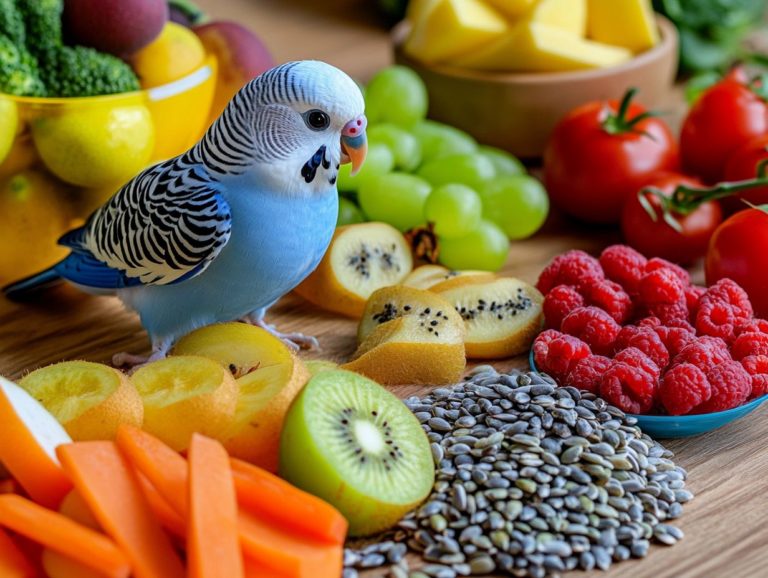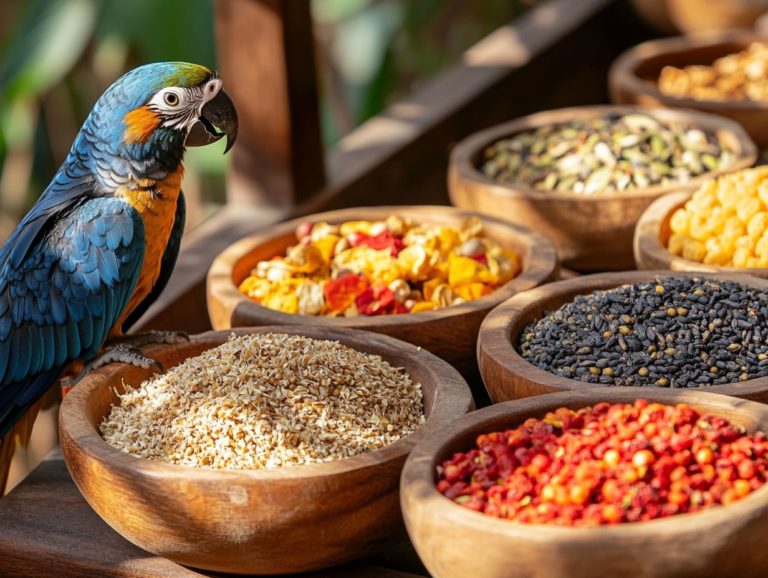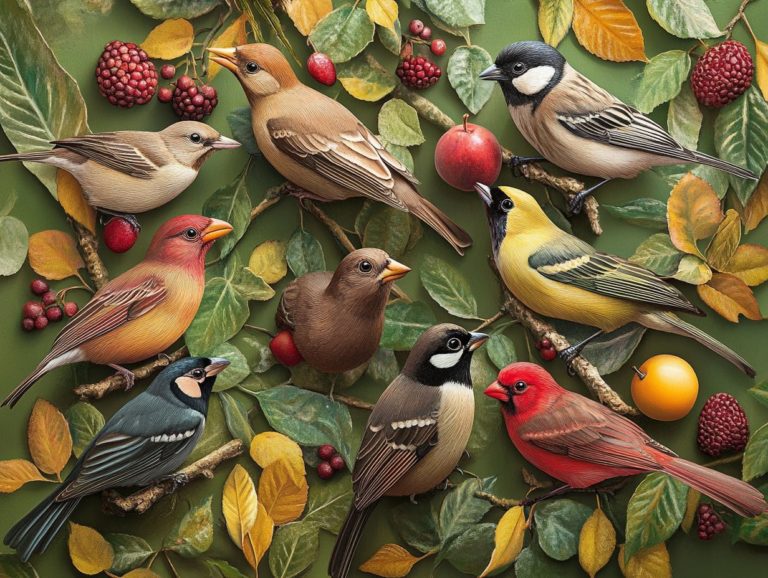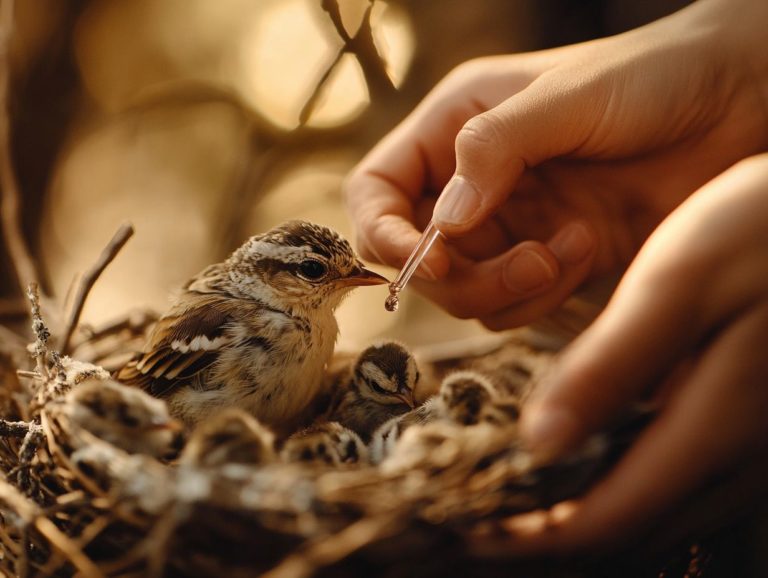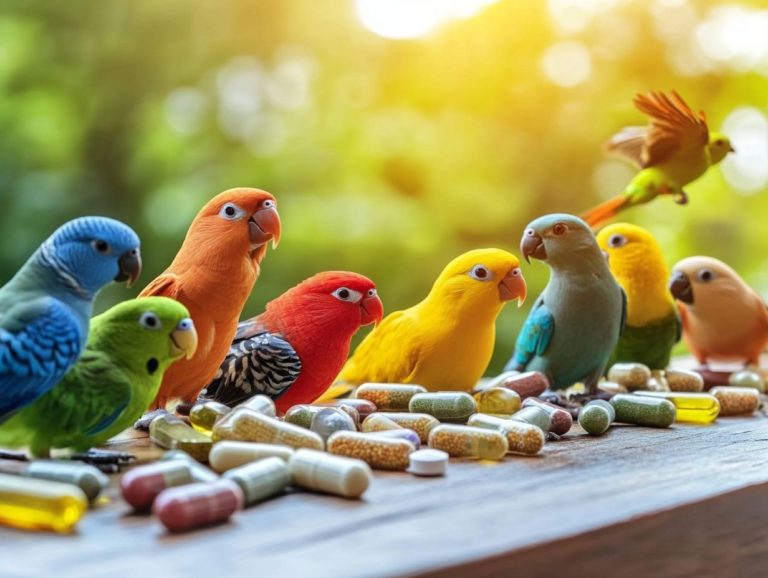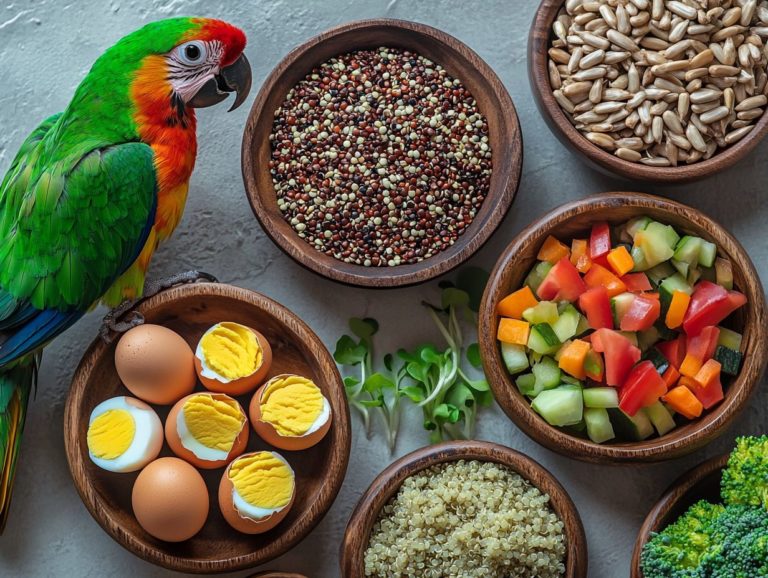The Benefits of Organic Bird Food
Selecting the right food for your feathered companions is essential for their health and happiness, especially when considering organic bird food.
Organic bird food emerges as an exceptional choice, presenting numerous benefits for both your birds and the environment, including improved bird health.
This article explores the exciting world of organic bird food! It highlights its health advantages, its nutritional content, and distinguishes it from non-organic alternatives.
You will also find valuable tips for flock owners on choosing the finest organic options and successfully transitioning your birds to a new diet, ensuring their well-being and vitality.
Contents
- Key Takeaways About Organic Bird Food:
- Understanding Organic Bird Food
- Benefits of Organic Bird Food
- Differences Between Organic and Non-Organic Bird Food
- Choosing the Right Organic Bird Food
- Factors to Consider
- How to Incorporate Organic Bird Food into Your Bird’s Diet
- Frequently Asked Questions
- What are the benefits of using organic bird food?
- How does organic bird food support the environment?
- What makes organic bird food more nutritious?
- Is organic bird food safe for all types of birds?
- Does organic bird food cost more than non-organic options?
- Are there any other benefits of choosing organic bird food?
Key Takeaways About Organic Bird Food:
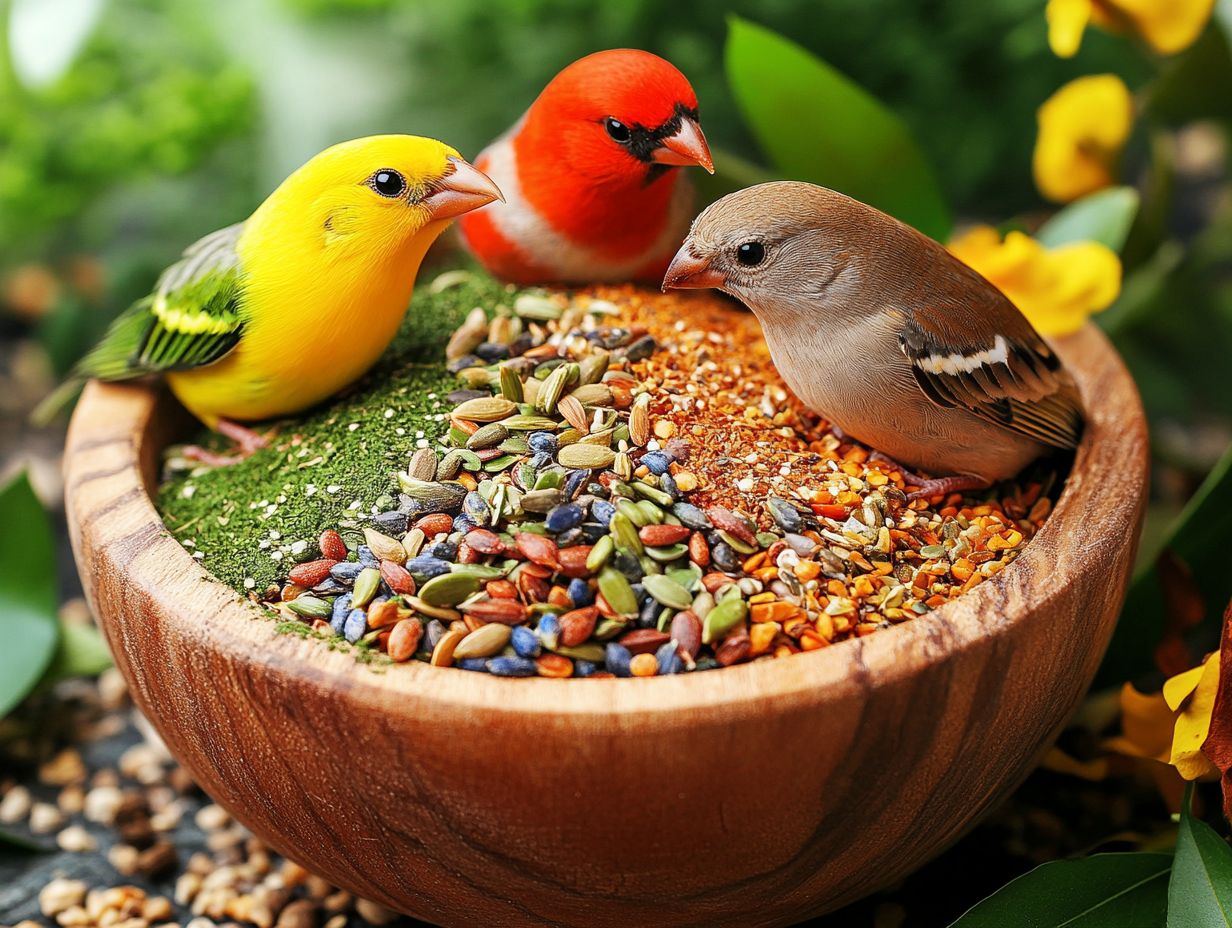
- Organic bird food is made without harmful chemicals, hormones, or genetically modified organisms, making it healthier for birds and the environment.
- Incorporating organic bird food into your bird’s diet can help improve their overall health and well-being, with benefits like stronger immune systems and better digestion.
- When choosing organic bird food, consider factors like the ingredients, production methods, and certifications to ensure you are getting a high-quality and truly organic product for your feathered friend.
Understanding Organic Bird Food
Understanding organic bird food is essential for anyone who cares about their birds’ health. This means recognizing the importance of high-quality ingredients that promote optimal bird health and follow sustainable practices.
As a bird enthusiast or flock owner, making a conscious decision to choose organic options reduces chemical exposure. It also supports local farmers committed to environmentally friendly methods. This awareness plays a vital role in disease prevention by improving nutritional content and ensuring that your feathered friends receive the essential nutrients and minerals they need to truly thrive.
What Makes Bird Food Organic?
Bird food is deemed organic when it adheres to specific standards set by organizations like the USDA, ensuring it remains free from harmful pesticides and synthetic additives.
Various certifying agents validate organic claims, ensuring that ingredients are cultivated sustainably. This dedication to quality often involves sourcing materials from local farmers who prioritize natural growing practices, enhancing the nutritional benefits of the food.
For bird enthusiasts, providing organic options offers substantial advantages. You support avian health by minimizing exposure to toxins and promoting a balanced diet through the use of organic blends. By choosing organic, you not only care for your feathered companions but also contribute to a more sustainable agricultural ecosystem.
Benefits of Organic Bird Food
The advantages of organic bird food reach far beyond simply nourishing your feathered companions; they play a crucial role in enhancing bird health and positively impacting the environment.
By choosing organic blends, you ensure that your birds receive the essential nutrients they need without the threat of harmful chemicals. This is vital not only for disease prevention but also for their overall vitality.
Furthermore, by supporting organic farming practices, you contribute to a healthier ecosystem, fostering a sustainable relationship between yourself and local farmers who are committed to providing quality ingredients.
Start exploring organic bird food options today for a healthier and happier flock!
Health Benefits for Birds
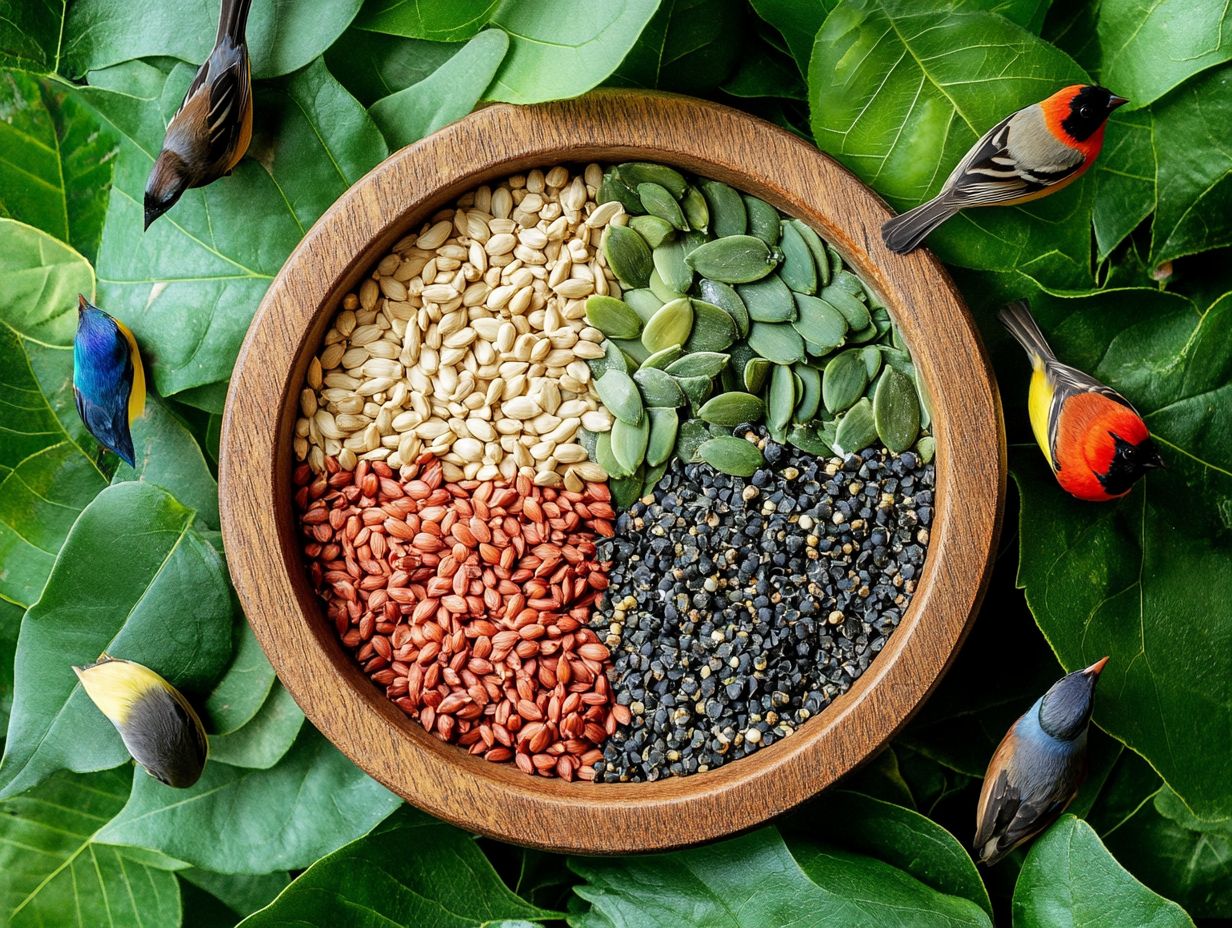
Feeding your birds organic bird food comes with remarkable health benefits. It offers a rich source of essential nutrients and minerals that are crucial for their well-being.
Organic bird food typically contains elevated levels of vitamins like A and E, along with omega-3 fatty acids. These are critical for immune function and feather health. Research featured in the Journal of Avian Medicine and Surgery highlights how these nutrients play a vital role in preventing common avian diseases and ensuring optimal vitality.
Organic formulations are generally free from pesticides and chemicals, significantly reducing the risk of exposure to harmful substances. By choosing organic options, you enhance your birds’ overall health and enable them to lead longer, healthier lives.
Environmental Benefits
The environmental benefits of choosing organic bird food are remarkable. It champions sustainable practices that contribute to a healthier ecosystem and support local farmers.
By embracing organic farming techniques, local farmers reduce chemical runoff that can jeopardize waterways and the surrounding wildlife. With a keen focus on safe fertilizers and natural pest control methods, these farmers nurture soil health, which supports a rich tapestry of plant and animal life.
This holistic approach enhances biodiversity and cultivates a thriving habitat for birds and other pollinators.
Prioritizing organic practices helps local farmers contribute to a healthier ecosystem, acting as stewards of their land while instigating positive environmental change.
Differences Between Organic and Non-Organic Bird Food
Understanding the distinctions between organic and non-organic bird food is essential for any bird enthusiast. It helps provide the best diet for their feathered friends and support aviculture.
Organic bird food uses premium ingredients that are free from harmful chemicals, pesticides, and artificial additives. In contrast, non-organic options can include synthetic ingredients that may negatively impact your birds health.
The production methods are markedly different; organic food tends to support sustainable practices and local farmers, ensuring ecological integrity and superior nutritional content for your pets.
Ingredients and Production Methods
The ingredients and production methods of organic bird food truly distinguish it from non-organic alternatives. They emphasize a commitment to quality ingredients sourced through sustainable practices.
These foods typically contain a delightful mix of seeds, nuts, fruits, and grains, all designed to provide essential nutrients and promote overall well-being in birds. For example, sunflower seeds are packed with healthy fats, while millet serves as an excellent source of carbohydrates.
By choosing organically grown produce, you ensure that your feathered friends enjoy a diet free from harmful chemicals, supporting their natural instincts and health.
The production methods prioritize environmentally friendly practices, guaranteeing that these food sources are cultivated without harmful chemicals. This benefits avian species and helps the planet thrive, creating a win-win for everyone involved.
Choosing the Right Organic Bird Food
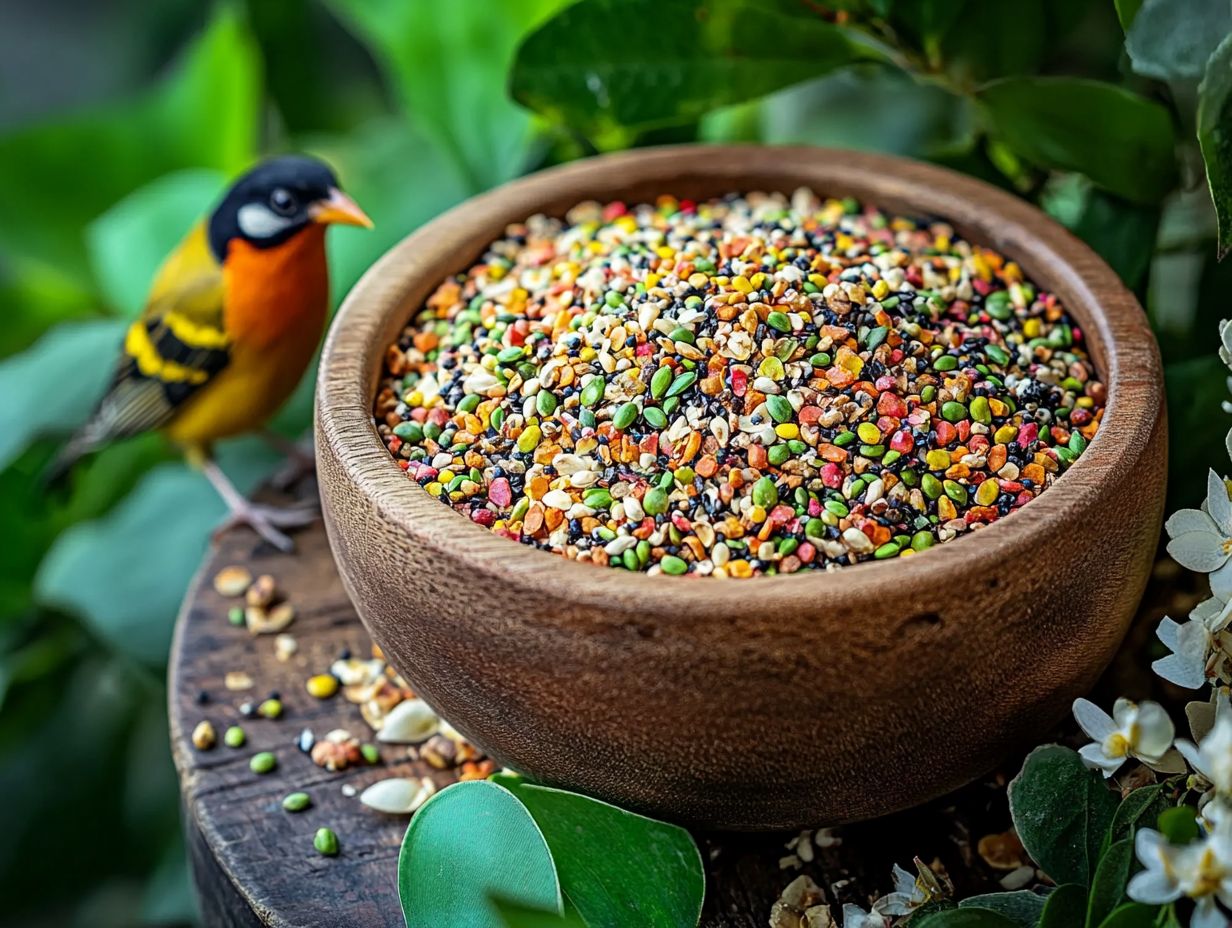
Selecting the ideal organic bird food is essential for any flock owner committed to offering optimal nutrition for their avian companions. Consider several factors, such as the quality of the ingredients, the reputation of the producers, and the sourcing practices that reflect sustainable agriculture.
Prioritize organic options that highlight nutrient-dense blends and support local farmers. This way, the food you provide not only nourishes your birds but also positively impacts the community.
Choose wisely, and watch your birds flourish!
Factors to Consider
When selecting organic bird food, several crucial factors come into play, including the quality of ingredients and sourcing from local farmers who prioritize sustainable practices and eco-friendly approaches.
Consider the nutritional value of the food, as organic varieties often boast a higher concentration of essential nutrients and minerals that can significantly benefit your birds’ health. By choosing options rich in vitamins, antioxidants, and healthy fats from powerful food options, you ensure that your feathered friends receive a balanced diet that supports their immune system and overall vitality.
Choosing organic food helps reduce the risk of exposure to harmful pesticides and chemicals often found in non-organic alternatives, promoting not just the health of your birds but also benefiting the environment.
Exploring various organic brands allows you to find the perfect mix that caters to your birds’ specific dietary preferences and needs.
How to Incorporate Organic Bird Food into Your Bird’s Diet
Incorporating organic bird food into your bird’s diet can truly transform their health and elevate your feeding practices, enhancing their overall vitality. This transition requires careful planning and consideration to ensure a smooth adjustment for your feathered friends.
As a responsible flock owner, introduce organic options gradually, keeping a close eye on your birds for positive signs of health, like enhanced vitality and improved feather quality.
Tips for a Smooth Transition
To ensure a seamless transition to organic bird food, adopt strategic feeding practices that emphasize a gradual adaptation process and minimize chemical exposure.
By thoughtfully mixing the old food with organic options, you allow your feathered companions to slowly acclimate to the new flavors and textures.
It s vital to closely observe your birds preferences; understanding which organic choices they favor will help you refine future meal preparations. Balancing the nutritional profile during this transition is essential.
Ensuring that your birds receive adequate protein, vitamins, and minerals will help maintain their vitality and overall well-being. This commitment to healthier food not only enhances your birds health but also promotes a stronger immune system, leading to longer, happier lives.
Frequently Asked Questions
Here are some common questions about organic bird food:
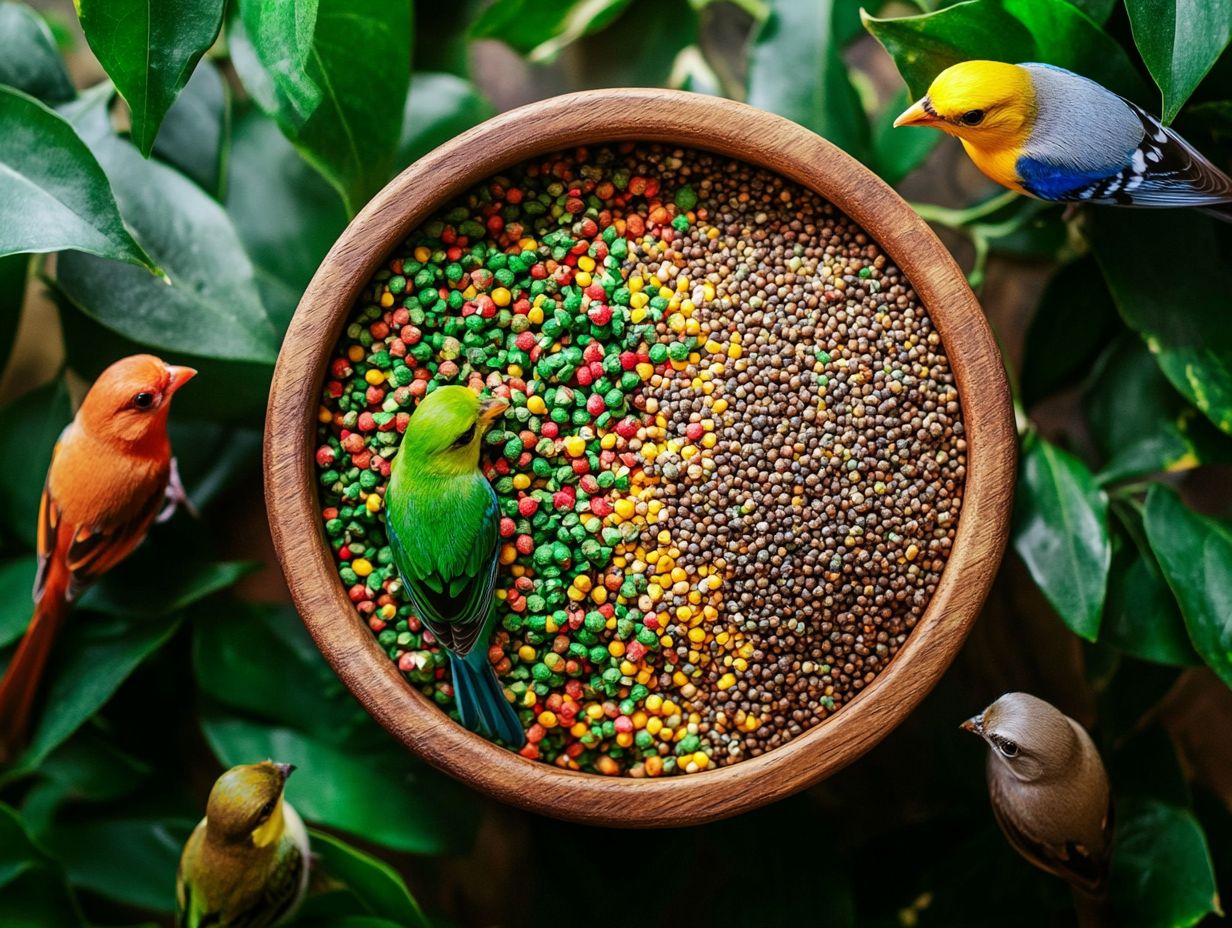
What are the benefits of using organic bird food?
Organic bird food is made with natural, non-toxic ingredients that are free from harmful chemicals and additives. This promotes overall health and longevity in birds, as well as reducing the risk of potential illnesses or allergies.
How does organic bird food support the environment?
Organic bird food is produced without the use of synthetic pesticides or fertilizers, which can be harmful to the environment. By choosing organic options, you are helping to protect natural habitats and decrease your carbon footprint.
What makes organic bird food more nutritious?
Organic bird food is typically made with high-quality, whole ingredients that are rich in essential nutrients. These ingredients are less processed and retain more of their natural vitamins and minerals, making it a healthier option for birds.
Is organic bird food safe for all types of birds?
Yes, organic bird food is safe for all types of birds, including parrots, finches, and canaries. It is important to choose a variety that is appropriate for your specific bird species and their dietary needs.
Does organic bird food cost more than non-organic options?
While organic bird food may be slightly more expensive than conventional options, the long-term benefits and health advantages for your bird make it a worthwhile investment. Plus, many organic brands offer bulk options at a more affordable price.
Are there any other benefits of choosing organic bird food?
Organic bird food is often produced by smaller, local companies that prioritize sustainable and ethical practices. By supporting these companies, you are also contributing to a more environmentally conscious and socially responsible industry.

